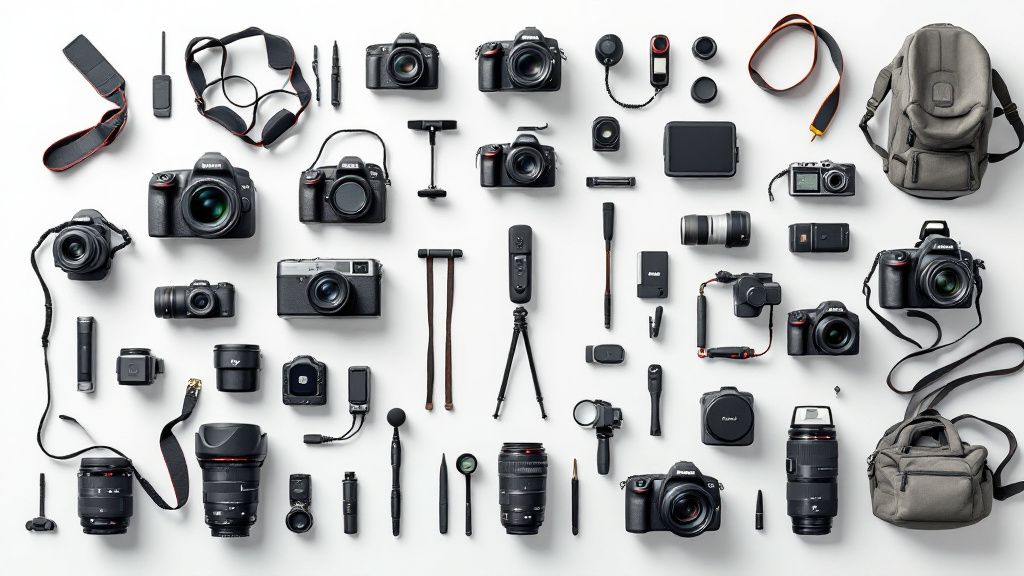Embarking on a journey into the realm of professional photography opens up a plethora of opportunities where creativity meets technique. This career invites you to capture moments, tell stories, and present perspectives uniquely through your lens. As you delve deeper, you’ll discover the diversity of paths, from becoming a freelance photographer to participating in photography workshops that enhance your skills. Exploring this world means finding your niche, whether it’s portrait, landscape, or commercial photography. Within this career in photography, each click not only shapes your artistry but also charts a fulfilling career trajectory. Your passion for visual storytelling could be the key to unlocking a lifelong profession.
Understanding the Photography Industry
To truly grasp the intricacies of the photography industry, you must recognize its dynamic nature and evolving trends. It encompasses a range of sectors, including advertising, fashion, and documentary photography. Each area demands different skills and techniques, offering diverse opportunities for those pursuing a career in photography. As you navigate this field, you might find yourself juggling roles from being a creative artist to a savvy businessperson.
Professional photography is not just about capturing striking images; it’s also about understanding your audience and the market demands. Participating in photography workshops can be instrumental in keeping up with the latest advancements and honing your craft. By staying ahead of the curve, you position yourself advantageously in a competitive environment.
In the next few years, the photography industry is expected to further integrate emerging technologies, like AI-enhanced editing tools and virtual reality. This integration will likely redefine traditional practices, creating exciting possibilities for a freelance photographer. Embracing these changes can set you apart, as the demand for innovative visual content continues to rise.
Aspiring photographers benefit from networking within the industry, attending exhibits, and engaging with peer communities. These interactions provide invaluable insights into trends and best practices, enriching your journey and shaping your career trajectory. Building these connections contributes significantly to your professional development and success.

Defining Your Niche as a Photographer
Becoming a successful photographer involves more than just mastering technical skills; it requires carving out your unique niche. Identifying what excites you about photography allows you to focus on specific subjects or styles, such as portraiture, wildlife, or editorial photography. As you refine your niche, you not only define your artistic identity but also build a distinctive brand that resonates with your audience and clients.
Finding your niche often starts with exploring different areas and reflecting on the types of projects that genuinely inspire you. Looking at professional photography through the lens of personal passion, we can see that this authentic interest propels your career forward. It can be the key to establishing a lasting impression in the competitive photography marketplace.
As you narrow down your focus, consider attending photography workshops that cater to your interests, providing you with specialized knowledge and skills. These workshops connect you with mentors and peers who share your passion and offer guidance on navigating challenges. In a career in photography, continuous learning can significantly elevate your expertise and credibility.
Defining your niche as a freelance photographer also involves understanding your ideal clients and their preferences. Tailoring your portfolio to align with specific demands helps attract opportunities that match your skills and interests. This strategic approach positions you to thrive, creating a fulfilling balance between your artistic ambitions and career objectives.
The Essential Skills Every Photographer Needs
Mastering essential skills is crucial for anyone aspiring to excel in photography. Technical proficiency, such as understanding exposure, composition, and lighting, forms the foundation of your craft. These skills enable you to bring your creative vision to life effectively, whether your focus is professional photography or building your portfolio as a successful freelance photographer in varying environments.
One of the most frequently asked questions about launching a career in photography is what skills are vital for success. Here’s the answer: beyond technical know-how, you need to develop keen observational skills and an eye for detail. This skillset helps you anticipate and capture spontaneous moments that tell compelling stories, adding depth and emotion to your images.
Interpersonal skills are equally important, especially when working with clients or coordinating photoshoots. Effective communication ensures you understand client needs and direct subjects comfortably during sessions. Participating in photography workshops can enhance these skills, offering practical experience in real-world scenarios and fostering collaboration with fellow photographers.
Time management and organizational skills are pivotal when juggling multiple projects or assignments, especially as a freelance photographer. This competency allows you to meet deadlines, manage bookings, and maintain a balanced workflow. With these essential skills in hand, you can navigate the creative and business aspects of your photography career with confidence.
Educational Pathways in Photography
Pursuing a career in photography often begins with exploring various educational pathways available today. Formal education options range from bachelor’s degrees in photography offered by universities to specialized courses at art schools. These programs cover a profound understanding of photographic techniques, history, and digital imaging skills, equipping you for the competitive landscape of professional photography. Tracing its evolution from the late 19th century, educational institutions have continually adapted, offering programs aligned with technological advancements and industry demands.
Beyond formal education, gaining experience through alternative avenues, such as photography workshops and online courses, provides flexibility and focused learning. These workshops often emphasize hands-on practice and real-world applications, crucial for aspiring freelance photographers. They allow you to hone specific skills under the guidance of seasoned professionals and expand your network, opening doors to exciting opportunities. Such immersive experiences can be pivotal in honing your artistic vision and technical expertise without committing to lengthy academic programs.
Apprenticeships and internships offer another path to gaining valuable experience in the photography field. Working alongside experienced photographers allows you to learn the craft’s intricacies, from managing studio setups to client interactions. These opportunities provide a glimpse into the realities of the photography business, helping you build a robust portfolio while developing essential industry relations.
Self-directed learning is also a valuable tool for those seeking to enter the field of photography. Leveraging online platforms, tutorials, and photography forums supports independent study. This path appeals especially to those pursuing a freelance photographer lifestyle, offering limitless resources to explore different styles and techniques. Curating your personal learning journey can be immensely fulfilling, providing the freedom to tailor your education to your specific interests and career goals.
Certifications from recognized photography organizations can further enhance your credibility. These credentials demonstrate a commitment to ongoing education and expertise in specific areas, which is beneficial when seeking clients or industry recognition. As you chart your educational path, considering a blend of traditional, alternative, and self-guided learning can pave the way for a successful and diverse career in photography.

Building a Photography Portfolio that Stands Out
Crafting a photography portfolio that captures attention begins with curating a collection that reflects your unique style and skills. Selecting your best work demonstrates versatility, showcasing diverse subjects or themes you’ve mastered. A thoughtfully organized portfolio illustrates your expertise in different areas of professional photography, whether it’s portrait, landscape, or editorial work. Each image should tell a story or evoke emotion, aligning with the vision you want to present to potential clients or employers.
What most people don’t see about building an exceptional portfolio is the behind-the-scenes detail of meticulous editing that makes all the difference. Selecting the right lighting, colors, and composition is crucial to creating visual harmony. This process often involves refining your work multiple times, ensuring each photograph contributes to a cohesive whole. Each adjustment can significantly enhance the impact of your portfolio, making you stand out in the competitive field of photography.
Participating in photography workshops can provide valuable feedback on your portfolio, offering perspectives from experienced professionals and peers. These insights can help you identify strengths and areas for improvement, guiding your selections for future work. Engaging with a community passionate about photography can inspire new ideas and motivate you to push the boundaries of your creative expression.
As you build your portfolio, consider its presentation format as well. Whether you choose a physical album or a digital showcase, make sure it’s accessible and user-friendly. For a freelance photographer, an online portfolio expands your reach, allowing potential clients worldwide to view your work. Highlighting your signature style and specialization in this format ensures your portfolio resonates with the right audience and opens doors to exciting career opportunities.

Marketing Your Photography Skills
Effectively marketing your photography skills involves leveraging various strategies to reach and engage your target audience. Building a strong personal brand is crucial, as it distinguishes you from other professionals in the industry. Creating a compelling narrative about your work and emphasizing your unique style can attract potential clients. Utilizing social media platforms to share your journey and showcase your work allows you to connect with a broader audience.
A professional website acts as a digital storefront for your portfolio, offering easy access to your best work. For example, many successful photographers combine high-quality visuals with engaging stories about each project on their websites. This approach not only draws attention but also fosters a deeper connection with viewers, providing insight into your creative process and enhancing your credibility as a photographer.
Networking within the photography community is another valuable strategy. Attending photography workshops and industry events opens doors to new connections and collaborations. Engaging with peers and professionals allows you to share knowledge, gain mentorship, and receive referrals. Establishing your reputation within these networks contributes significantly to your career growth and development.
Taking advantage of online directories and platforms specializing in professional photography can increase your visibility. For a freelance photographer, listing your services on sites like Behance or 500px helps reach potential clients actively seeking creative professionals. These platforms also offer opportunities to connect with brands and agencies looking for fresh talent for various projects.
Consider traditional marketing methods, such as print campaigns, to target local markets. Distributing high-quality business cards or brochures at exhibitions or local events can leave a lasting impression. Incorporating testimonials and reviews from satisfied clients in your marketing materials adds authenticity and encourages trust. Using a multifaceted approach ensures you reach diverse audiences, maximizing opportunities to grow your career in photography.



